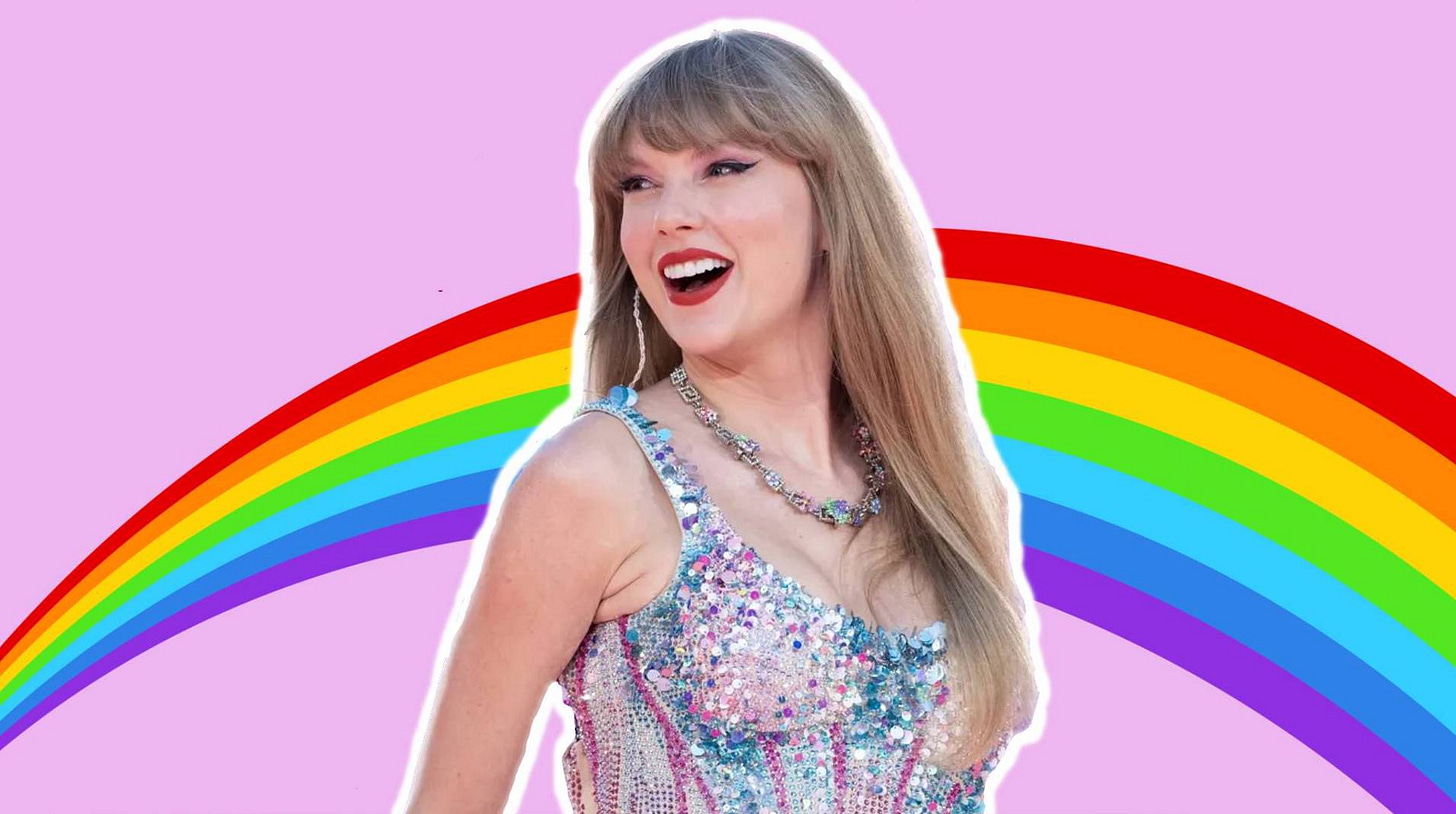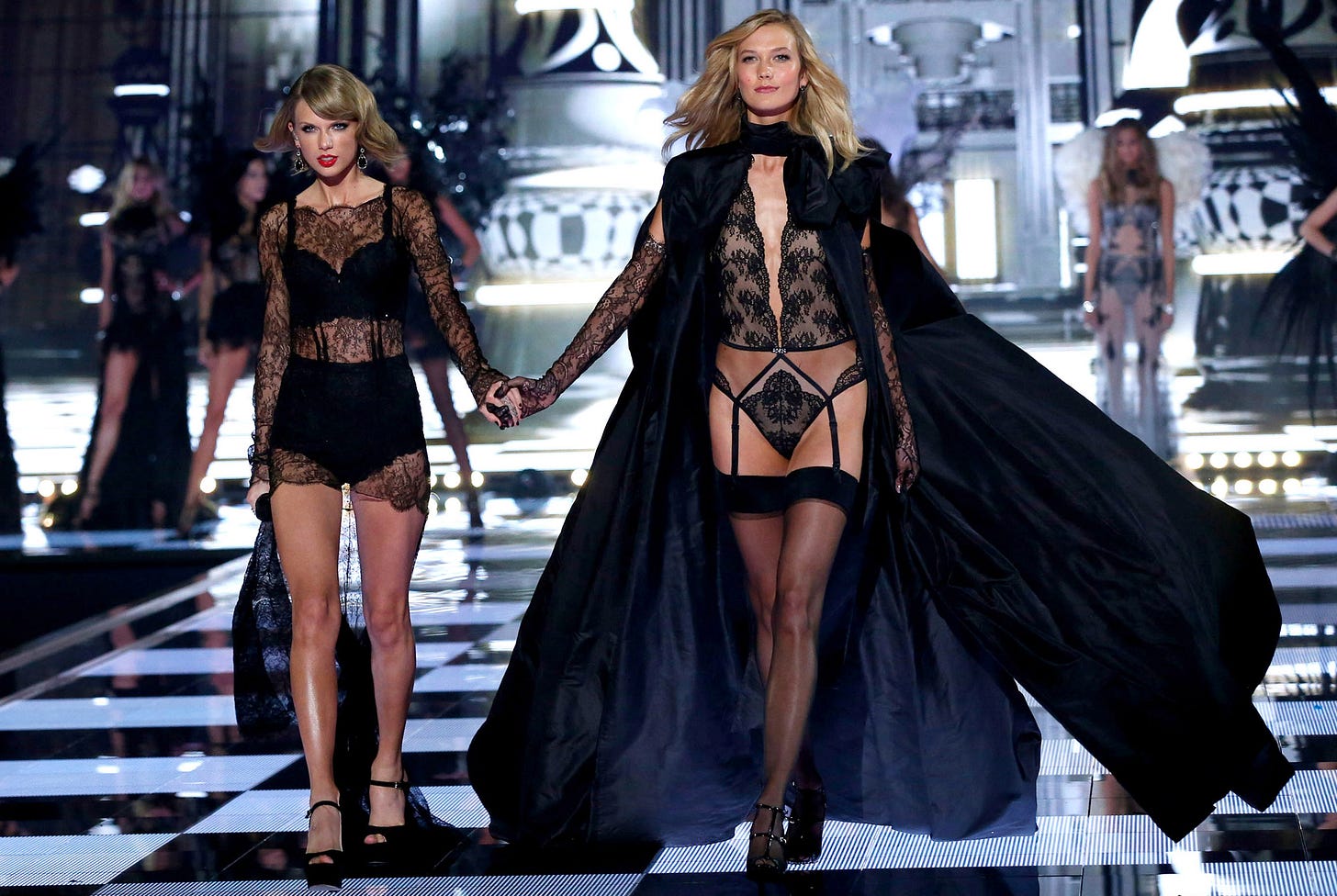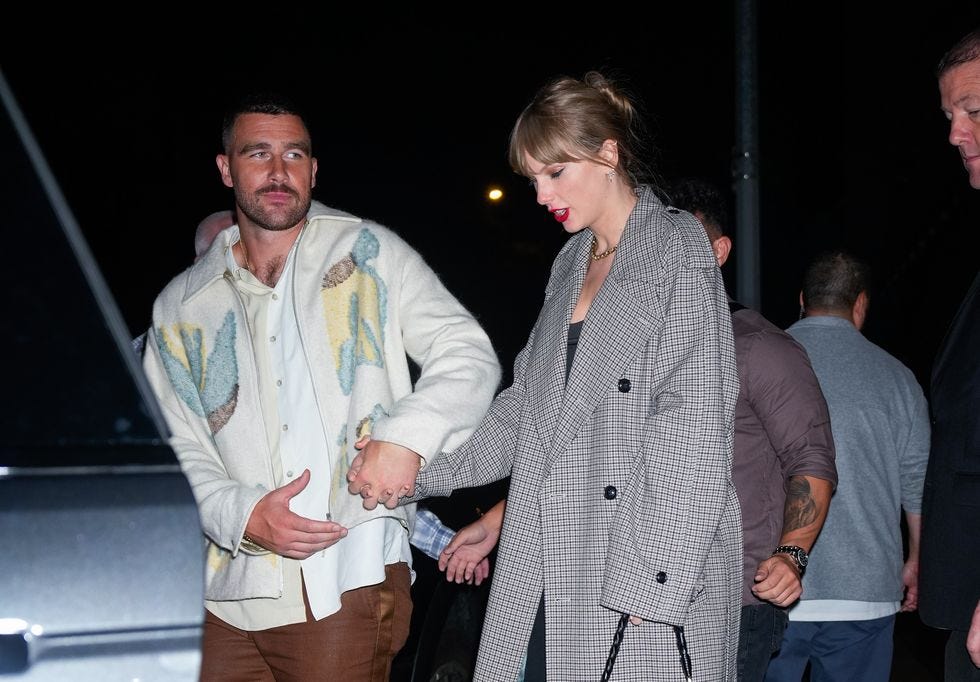The Great Gaylor Debacle
From delulu behavior to political action
This is the Sunday Edition of Paging Dr. Lesbian. If you like this type of thing, subscribe, and share it with your friends. Upgrade your subscription for more, including weekly dispatches from the lesbian internet, monthly playlists, and a free sticker.
The whole world is contained within the Taylor Swift fandom. The Swifties engage in political conflicts, complex social dynamics, and every shade of discourse you can imagine.
Last week, a new document rocked the fandom, affecting the Gaylors most urgently. The Gaylors are a group of Swifties who believe Swift is secretly gay or queer, or at the very least, interpret her lyrics from a queer perspective. Gaylor conspiracy theory number one is the existence of Kaylor, the supposed relationship between Swift and her former best friend Karlie Kloss. (Swiftgron, which alleges a relationship between Swift and Diana Agron, is another favorite within the fandom.)
Not all queer Swifties count themselves as Gaylors, and Gaylors vary in dedication. Some are deep into the conspiracies, others simply read queerness into her lyrics for their own enjoyment. One fan, who runs the @gaylornews account, told Rolling Stone “Gaylor is about queer people finding a safe space which straight people not only find but already have everywhere, is about all the things you never learned about yourself, is about feeling seen and genuinely understood.”
The Gaylors have long courted controversy within Swiftiedom, as many “non-believers” find their antics to be annoying at best, and downright toxic at worst. A Graphika report found that 9% of Swiftie accounts in their sample were Gaylor accounts, while 28% were anti-Gaylor accounts. This means that while harassment occurs from both groups, Anti-Gaylors – also known as “Hetlors” by the Gaylors – have more power to drive the overall Swiftie narrative, and their harassment carries more weight.
These dynamics reared their head following the release of Swift’s “prologue” for 1989 (Taylor’s Version). The essay explains what was going on in Swift’s life when the album first dropped in 2014. She discusses how she was slut shamed and the media assumed she was dating every man she hung out with. But the portion that has garnered the most attention is one line in particular: “If I only hung out with my female friends, people couldn’t sensationalize or sexualize that — right? I would learn later on that people could and people would.”
Reactions to the prologue have varied. The Anti-Gaylors responded1 by celebrating the demise of the Gaylors, writing things like “today i bathe in Gaylor tears.” These Swifties allege that Gaylors aren’t real Taylor Swift fans, calling them “haters” and “disgusting.” Presumably, these users have been waiting for a fate like this to befall the Gaylors and relish the chance to dunk on these so-called fake Swifties. On the other hand, one fan suggested that, right or wrong, the Gaylors make up a powerful portion of the fan base, and noted “We can’t lose streams from the gaylors.”
Unsurprisingly, the Gaylors themselves had a lot to say about the letter. “Is this the end?” one Gaylor asked. Many felt disappointed and dejected, with one fan comparing their feelings to Carrie being covered in pig’s blood at the prom. One Gaylor described their reaction to the prologue and their general relationship with Swift like this: “i just wanted to think that maybe the biggest pop star In the world could be someone like me and she could be feeling the way I was feeling.” Others doubled down. “We Will Still Exist,” reads the title of a post on Reddit.
Some Gaylors announced they were leaving the fandom altogether, either because they felt the theories had gone too far or that it was just time to move on. Other responses were more tempered, as casual Gaylors suggested their brethren chill out. One fan, tired of the discourse, posted a list of out queer artists that disappointed Gaylors might want to stan instead.
The general response to the prologue is more complicated than it might have initially appeared. Because the internet traffics in drama, the most visible reactions are also the most hyperbolic ones, like the fan who said they felt like they’d had pig’s blood dumped on their head. The Anti-Gaylors use these bombastic responses to prove their point about how “delulu” – short for delusional – the Gaylors really are.
While it’s true that some Gaylors exhibit classic conspiracy theory behavior, the undercurrent of homophobia here is hard to ignore. The vitriol aimed at Gaylors is intense, especially when you consider how small the Gaylor fandom is within the larger Swiftiedom. Moreover, many Gaylors have alleged that the Anti-Gaylors are hypocritical in their criticisms. A significant portion of Swift’s (straight) fandom closely follows Swift’s love life, from her current relationship with football player Travis Kelce to her past relationships with men like Harry Styles (often thought to be one of the central characters in 1989.) Some fans suggest it’s time for Swift to settle down and have kids with Kelce, a sentiment Gaylors find distasteful and patronizing.
Swift’s apparent commentary on the Gaylors – which marks the first instance of her referencing these theories, even obliquely – is far from the only time she has expressed frustration with speculations about her dating life. (Most of the prologue concerns media conjecture about her dalliances with men, save for that one line about her female friends.) She has consistently pushed back against this focus on her romances, while at the same time encouraging fans to engage deeply with her often autobiographical lyrics.
This dynamic prompts us to consider how Swift may implicitly embolden these conspiracy theories. She is famous for leaving easter eggs in her music and promotional materials, inviting fans to analyze her every move. The diaristic nature of her lyrics – with the exception of folklore and evermore – leads fans to speculate about the subjects of her songs. It’s not surprising then, that Gaylors created a 37-slide powerpoint detailing why Reputation is about Karlie Kloss.
So where does that leave the Gaylors today? Some fans have pivoted in surprising directions. Oddly enough, Swift’s ex, Joe Alwyn, has become a favorite among Gaylors as of late, perhaps in part because the all-American heterosexuality of the Swift/Kelce relationship feels a little over-the-top. Equally as important is the fact that out of all Swift’s exes, pretty boy Alwyn looks the most like a lesbian.
And then there’s the unexpected political drama of it all. Karlie Kloss – who is in fact not universally loved by Gaylors – recently posted pro-Israel content on her Instagram, angering some fans. On the other hand, Alwyn signed the Artists Call for Ceasefire Now petition, a piece of news that Gaylor Updates posted on Twitter. The fact that many Gaylors are now anti–Karlie and pro-Joe illustrates that the Gaylors aren’t as militant as you might think. (Certain hardline Swifties jumped on the anti-Joe campaign following their breakup, a turn of events that supports the Gaylors’ charge of hypocrisy.)
Even more fascinating is the current #SwiftiesforPalestine movement, which calls on Swift to support an immediate ceasefire, stop attending NFL games until the NFL supports a ceasefire, and not release the Eras Tour movie to a company that funds Israel, like Disney, until they cut ties. A significant portion of the fans using this hashtag are either Gaylors or queer swifties (the two are not synonymous), indicating that there is a social and political throughline within segments of the fandom.
This contemporary movement recalls the famous incident in 2019 when a queer Swiftie went viral for going to prison after refusing to join the IDF – a trenchant confluence of fandom and politics still referenced today. Earlier this year, the Gaylors took a stand against Swift’s ex Matty Healy, who made headlines for his racist and sexist comments. When a photo of Healy’s band, The 1975, holding a check for $500 made out to the San Diego Lesbian, Gay, Bisexual, and Transgender Community Center circulated online, fans found the small number insulting. In response, one fan launched a fundraiser for the center, raising nearly $5,000 and helping them reach their $100,000 goal.
Ultimately, there is more nuance here than meets the eye. Though Taylor Swift may be the closest thing we have to monoculture in today’s siloed media landscape, there are numerous factions within her fandom, each with their own viewpoints and takes on her music. Attacks on the Gaylors often promote homophobia, though that’s not to say the Gaylors are without toxic elements. Any type of wholehearted stanning contains shades of delusion, whether you’re gay or straight.
The difference lies in how these fan groups are treated, a distinction often based on broader cultural norms. Whether Swift was truly trying to shut down the Gaylors or not, what this fracture reveals is how personal and subjective fandom can be – and usually is. Out of all the contemporary pop star fandoms, Swifties probably have the most parasocial relationship with their beloved, a form of intimacy Swift herself solicits. (This collective intimacy is likely the main reason for her astonishing success.)
The Gaylor “callout” illustrates both the precarity of these largely symbolic relationships and the individual investment fans have in Swift and her music. Fandom can be life-affirming, but it can also reflect the basest of human impulses. This is a dichotomy Gaylors – and unaffiliated queer Swifties – know all too well. On the Swiftie internet, the lines between private and public, as well as personal and universal, are consistently blurred.
The Gaylors want Swift’s life and lyrics to reflect their own experiences, and so do the Anti-Gaylors. In theory, Swift’s outsized persona has the power to embody all of these contradictory desires at once, though last week’s controversy reveals the cracks in the foundation. Love makes us all a little delulu, and in this case, these conflicting visions have met to duke it out on the digital playground. Taylor Swift can be anything you want her to be, right up until the illusion is shattered.
I’ve elected not to include any links to tweets or Reddit posts because I don’t want to encourage further conflict or attack/criticize specific fans. Peace on earth ✌🏼.






Love this. I am a full-on gaylor, albeit one who does not participate in the online fan culture - I think that Taylor is probably bi and am completely convinced by a variety of online evidence that she and Karlie dated and that she's also dated other women. One thing that's interesting to me is that there's an inherent aspect of frustration to being a gaylor - like you have to be at least a little annoyed with Taylor for refusing to come out when she absolutely could do so and still sell out a stadium in .2 seconds. We are not uncritical stans!
Right now she's in a moment of returning to her highly publicized stunt dating ways of the past, which historically she accompanies with complaining about people talking about said stunt dating, and so it makes sense to me that she's choosing this moment to refute the gaylors - I see this as her era of weirdly doubling down on heterosexuality and I personally don't like it. Maybe this is pedantic but I think it's worth noting that her statement didn't actually say that she and Karlie didn't date or that the rumors were wrong lol! Much more I could say but I'll stop there lol.
I would love validation for Gaylors